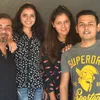Coworking startup Dextrus achieved 90 pc occupancy in less than a year by marrying business and design
Launched in 2018 by architect-turned-entrepreneur Robin Chhabra, Dextrus is a premium, 160-seater coworking space in BKC. A year on, the founder is readying to launch his second coworking space in Mumbai.
As more and more millennials turn entrepreneurs and startups become de rigueur, shared offices have become mainstream. So much so, that even bigger, established organisations are welcoming the idea, and trading their shoe-box offices for swanky coworking spaces that take care of a company’s end-to-end needs.
Mumbai-based Dextrus, a premium coworking space, aims to tap this growing market. Launched in 2018, the sprawling coworking space is located in the heart of Mumbai’s Bandra Kurla Complex. Spread across 15,000 sq ft, it aims to help people “focus, collaborate, socialise, and learn”.
1563195194830.png?fm=png&auto=format)
Architect-turned-entrepreneur Robin Chhabra
“Dextrus was launched with one simple aim: to create a designed office environment where professionals of any kind can come and enjoy doing their work while we take care of everything else,” says Founder Robin Chhabra, who also co-designed the coworking space with architect Nishil Shah.
The 160-seater office is a visual delight. Warm, clean, and simple aesthetics, in the form of white and gold accents, dominate the interiors; an occasional pop of pink and perfectly placed greens break the monotony.
That Dextrus is vying to grab eyeballs with its superior design aesthetics is clear. But the coworking space is so much more. It offers features such as the Dextrus Desk (hot desk or others), Dextrus Office (private rooms), Dextrus Daily (a flexible day pass), and Dextrus Virtual (a remote office).
Apart from that, there’s a library, private meeting rooms, boardrooms equipped with video and audio conferencing facilities, premium tech infrastructure, and 24x7 tech support. Simply put, it’s an entire gamut of services rolled into one single package without the fuss of maintenance.
Balancing style and pragmatism
When it comes to this generation of entrepreneurs and business leaders, “collaboration” has emerged as a driving force. And nothing inspires collaboration – across teams and professionals – like a coworking space.
The essence of this kind of workspace involves dissolving walls and evoking a sense of flexibility, networking, and community.
At Dextrus, the impact of this coworking spirit is evident in its DNA – its design and building process was put together through a harmonious collaboration between architects, artisans, tradesman, contractors, project managers, and various other consultants.
1563195284829.png?fm=png&auto=format)
Inside Mumbai-based Dextrus
A simple example of this synergy is the doll display at the reception. Collaboration between Rajasthani painters and a Vishakhapatnam doll maker, under the guidance of a youthful design team, has led to an installation that every visitor regards as a breath of fresh air.
There are more such personalised touches across the property. For instance, the bespoke furniture, textures of CNC-cut patterned wood panels, and the lime-plastered ceilings – all these add depth and texture to the interior but also showcase the personal taste of the man behind Dextrus - architect-turned-entrepreneur Robin Chhabra.
After schooling at Winchester College in the UK, Robin went on to pursue a bachelor’s and master’s degree in architecture at the University of Michigan, Ann Arbor.
“Between bachelor's and master's,” he tells us, “I worked in Singapore for two years with a boutique architecture design firm where I designed at various scales, from theatre set design to hotel design.”
“Post my master's, I returned to Mumbai to gain experience in India. I worked with an architecture firm where I got the opportunity to design different typologies, including residential, commercial, and hospitality projects,” he adds.
His taste, unsurprisingly enough, thanks to his experience overseas and then back in India, is an eclectic mix of “style” and “pragmatism”, something that’s abundantly reflected in his entrepreneurial debut.
Marrying business with design
“I felt that as architects, we are consistently trying to convince the business side of design decisions and quite often a compromise is required to marry design and business,” says Robin, adding, “If architects could understand the business side of their decisions, perhaps it would lead to a different kind of creative energy.”
“Coworking spaces are a great example of where business meets design, and that pursuit seemed like a natural transition,” he tells us, explaining why he launched a coworking startup.
Robin’s instinct for the business side of his startup is noticeable. He speaks with equal passion about the two – design and business – when he says that the attention to detail had to be coupled with “equal rigour to services”.
1563195334149.png?fm=png&auto=format)
A combination of pragmatism and style
By services, he means some of the basic amenities, and the premium facilities that Dextrus has happily rolled into a single package for its members. These include meeting rooms of varying sizes, staff support six days a week, postal management, common areas flush with sunlight and a view of the skyline, and provisions that keep in mind the comfort of the community members.
“We have a dry snacks and goodies marketplace where clients can get anything, from juices to healthy snacks, and we are also planning on bringing in more food services for the clients,” Robin says.
Growth and expansion
At the moment, Dextrus houses 24 companies. Of these companies, working out of the BKC-based coworking space, some are large enterprises while others are SMEs, operating across a wide range of domains, including wealth management, online beauty products, utilities, NGOs, production, luxury travel, online gaming, tech, etc.
“All of these companies found value in the design, flexibility and the infrastructure of the space,” Robin says.
Perhaps that’s the reason why Dextrus, started with an initial investment of Rs 1 crore (partly from Robin’s personal savings and partly raised from family members), was able to outperform all expectations and achieve 90 percent occupancy in less than a year’s time.
“The first marker of growth in coworking is occupancy. We have grown from 0 to 90 percent occupancy in 10 months (comprising mostly long-term clients). Our revenue has grown a healthy 20 percent month on month consistently, being at an average of 115 percent of predicted revenue,” he says.
Dextrus’ growth can easily be attributed to the massive rise in the demand for coworking spaces in India. In fact, in 2018, even with the sector clocking in 11 million sq ft in the first quarter of the year, the sector witnessed a gap between the demand and supply of spaces.
And this is only going to widen in the coming years with India projected to become a global leader, along with China, in the worldwide coworking market that itself is set to expand to over 30,432 locations by 2022, according to the Global Coworking Unconference Conference.
To survive in this increasingly competitive scenario, Dextrus is relying heavily on its superior design elements along with the usual platter of premium services.
As the steel and glass landmark stands tall amid a sea of modern architecture in Mumbai’s BKC, Founder Robin is also getting set for his next mission. With his feet set deep in the financial capital of India, “currently”, he says, he is “concentrating on expanding in Mumbai”.
“We look to have a second centre in Mumbai the next nine months and hope to have about four to five more in the city in the next two years,” he says.
(Edited by Teja Lele Desai)


1563195194830.png?mode=crop&crop=faces&ar=2%3A1&format=auto&w=1920&q=75)

1562965182844.png?fm=png&auto=format&h=100&w=100&crop=entropy&fit=crop)





